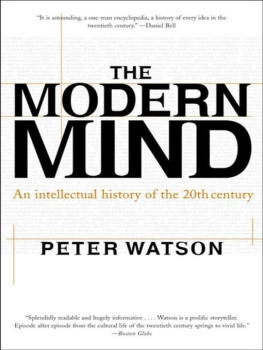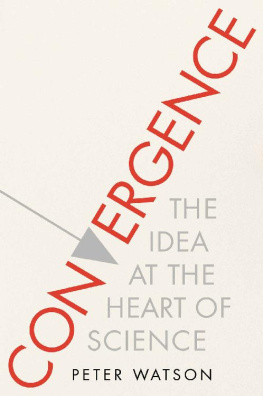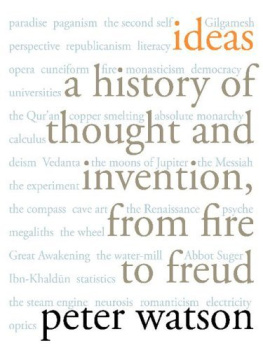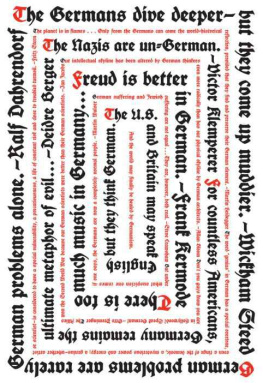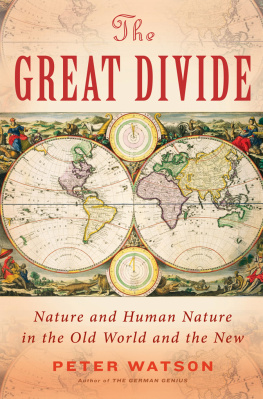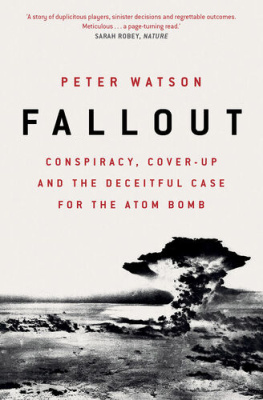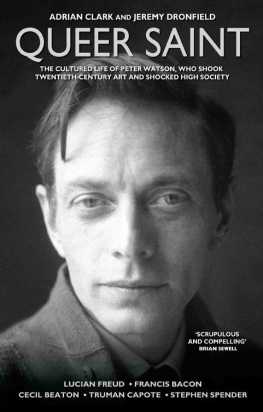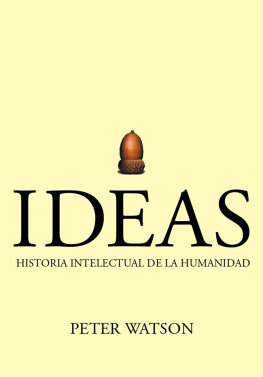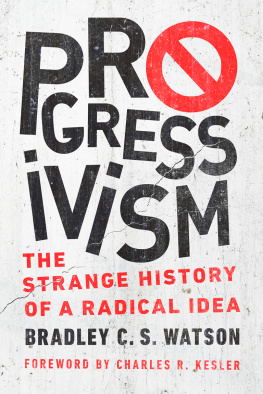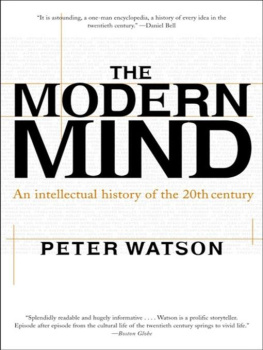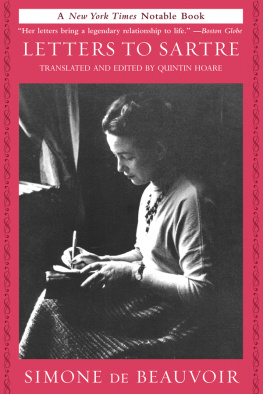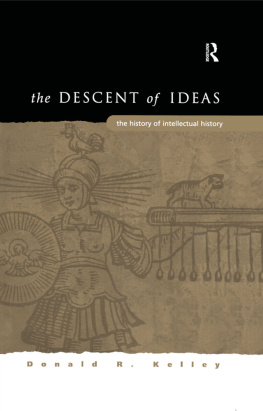In the mid-1980s, on assignment for the London Observer, I was shown around Harvard University by Willard van Orman Quine. It was February, and the ground was covered in ice and snow We both fell over. Having the worlds greatest living philosopher all to myself for a few hours was a rare privilege. What surprised me, however, was that when I recounted my day to others later on, so few had heard of the man, even senior colleagues at the Observer. In one sense, this book began there and then. I have always wanted to find a literary form which, I hoped, would draw attention to those figures of the contemporary world and the immediate past who do not lend themselves to the celebrity culture that so dominates our lives, and yet whose contribution is in my view often much more deserving of note.
Then, around 1990, I read Richard Rhodess The Making of the Atomic Bomb. This book, which certainly deserved the Pulitzer Prize it won in 1988, contains in its first 300 pages an utterly gripping account of the early days of particle physics. On the face of it, electrons, protons, and neutrons do not lend themselves to narrative treatment. They are unlikely candidates for the bestseller lists, and they are not, exactly, celebrities. But Rhodess account of even quite difficult material was as accessible as it was riveting. The scene at the start of the book in 1933, where Leo Szilard was crossing Southampton Row in London at a set of traffic lights when he first conceived the idea of the nuclear chain reaction, which might lead to a bomb of unimaginable power, is a minor masterpiece. It made me realise that, given enough skill, the narrative approach can make even the driest and most difficult topics highly readable.
But this book finally took form following a series of discussions with a very old friend and colleague, W. Graham Roebuck, emeritus professor of English at McMaster University in Canada, a historian and a man of the theatre, as well as a professor of literature. The original plan was for him to be a joint author of The Modern Mind. Our history would explore the great ideas that have shaped the twentieth century, yet would avoid being a series of linked essays. Instead, it would be a narrative, conveying the excitement of intellectual life, describing the characters their mistakes and rivalries included that provide the thrilling context in which the most influential ideas emerged. Unfortunately for me, Professor Roebucks other commitments proved too onerous.
If my greatest debt is to him, it is far from being the only one. In a book with the range and scope of The Modern Mind, I have had to rely on the expertise, authority, and research of many others scientists, historians, painters, economists, philosophers, playwrights, film directors, poets, and many other specialists of one kind or another. In particular I would like to thank the following for their help and for what was in some instances a protracted correspondence: Konstantin Akinsha, John Albery, Walter Alva, Philip Anderson, R. F. Ash, Hugh Baker, Dilip Bannerjee, Daniel Bell, David Blewett, Paul Boghossian, Lucy Boutin, Michel Brent, Cass Canfield Jr., Dilip Chakrabarti, Christopher Chippindale, Kim Clark, Clemency Coggins, Richard Cohen, Robin Conyngham, John Cornwell, Elisabeth Croll, Susan Dickerson, Frank Diktter, Robin Duthy, Rick Elia, Niles Eldredge, Francesco Estrada-Belli, Amitai Etzioni, Israel Finkelstein, Carlos Zhea Flores, David Gill, Nicholas Goodman, Ian Graham, Stephen Graubard, Philip Griffiths, Andrew Hacker, Sophocles Hadjisavvas, Eva Hajdu, Norman Hammond, Arlen Hastings, Inge Heckel, Agnes Heller, David Henn, Nerea Herrera, Ira Heyman, Gerald Holton, Irving Louis Horowitz, Derek Johns, Robert Johnston, Evie Joselow, Vassos Karageorghis, Larry Kaye, Marvin Kalb, Thomas Kline, Robert Knox, Alison Kommer, Willi Korte, Herbert Kretzmer, David Landes, Jean Larteguy, Constance Lowenthal, Kevin McDonald, Pierre de Maret, Alexander Marshack, Trent Maul, Bruce Mazlish, John and Patricia Menzies, Mercedes Morales, Barber Mueller, Charles Murray, Janice Murray, Richard Nicholson, Andrew Nurnberg, Joan Oates, Patrick OKeefe, Marc Pachter, Kathrine Palmer, Norman Palmer, Ada Petrova, Nicholas Postgate, Neil Postman, Lindel Prott, Colin Renfrew, Carl Riskin, Raquel Chang Rodriguez, Mark Rose, James Roundell, John Russell, Greg Sarris, Chris Scarre, Daniel Schavelzn, Arthur Sheps, Amartya Sen, Andrew Slayman, Jean Smith, Robert Solow, Howard Spiegler, Ian Stewart, Robin Straus, Herb Terrace, Sharne Thomas, Cecilia Todeschini, Mark Tomkins, Marion True, Bob Tyrer, Joaquim Valdes, Harold Varmus, Anna Vinton, Carlos Western, Randall White, Keith Whitelaw, Patricia Williams, E. O. Wilson, Rebecca Wilson, Kate Zebiri, Henry Zhao, Dorothy Zinberg, W. R. Zku.
Since so many twentieth-century thinkers are now dead, I have also relied on books not just the great books of the century but often the commentaries and criticisms generated by those original works. One of the pleasures of researching and writing The Modern Mind has been the rediscovery of forgotten writers who for some reason have slipped out of the limelight, yet often have things to tell us that are still original, enlightening, and relevant. I hope readers will share my enthusiasm on this score.
This is a general book, and it would have held up the text unreasonably to mark every debt in the text proper. But all debts are acknowledged, fully I trust, in more than 3,000 Notes and References at the end of the book. However, I would like here to thank those authors and publishers of the works to which my debt is especially heavy, among whose pages I have pillaged, prcised and paraphrased shamelessly. Alphabetically by author/editor they are: Bernard Bergonzi, Reading the Thirties (Macmillan, 1978) and Heroes Twilight: A Study of the Literature of the Great War (Macmillan, 1980); Walter Bodmer and Robin McKie, The Book of Man: The Quest to Discover Our Genetic Heritage (Little Brown, 1994); Malcolm Bradbury, The Modern American Novel (Oxford University Press, 1983); Malcolm Bradbury and James McFarlane, eds., Modernism: A Guide to European Literature 18901930 (Penguin Books, 1976); C. W. Ceram, Gods, Graves and Scholars (Knopf, 1951) and The First Americans (Harcourt Brace Jovanovich, 1971); William Everdell, The First Moderns (University of Chicago Press, 1997); Richard Fortey, Life: An Unauthorised Biography (HarperCollins, 1997); Peter Gay, Weimar Culture (Seeker and Warburg, 1969); Stephen Jay Gould, The Mismeasure of Man (Penguin Books, 1996); Paul Griffiths, Modern Music: A Concise History (Thames and Hudson, 1978 and 1994); Henry Grosshans, Hitler and the Artists (Holmes and Meier, 1983); Katie Hafner and Matthew Lyon, Where Wizards Stay Up Late: The Origins of the Internet (Touchstone, 1998); Ian Hamilton, ed., The Oxford Companion to Twentieth-Century Poetry in English (Oxford University Press, 1994) ; Ivan Hannaford, Race: The History of an Idea in the West (Woodrow Wilson Center Press, 1996); Mike Hawkins, Social Darwinism in European and American Thought, 18601945 (Cambridge University Press, 1997); John Heidenry, What Wild Ecstasy: The Rise and Fall of the Sexual Revolution (Simon and Schuster, 1997); Robert Heilbroner, The Worldly Philosophers: The Lives, Times and Ideas of the Great Economic Thinkers (Simon and Schuster, 1953); John Hemming, The Conquest of the Incas (Macmillan, 1970); Arthur Herman, The Idea of Decline in Western History (Free Press, 1997); John Horgan, The End of Science: Facing the Limits of Knowledge in the Twilight of the Scientific Age (Addison-Wesley, 1996); Robert Hughes, The Shock of the New (BBC and Thames and Hudson, 1980 and 1991); Jarrell Jackman and Carla Borden, The Muses Flee Hitler: Cultural Transfer and Adaptation, 19301945 (Smithsonian Institution Press, 1983); Andrew Jamison and Ron Eyerman, Seeds of the Sixties (University of California Press, 1994); William Johnston, The Austrian Mind: An Intellectual and Social History, 18481938 (University of California Press, 1972); Arthur Knight, The Liveliest Art (Macmillan, 1957); Nikolai Krementsov, Stalinist Science (Princeton University Press, 1997); Paul Krugman, Peddling Prosperity: Economic Sense and Nonsense in the Age of Diminished Expectations (W. W. Norton,

